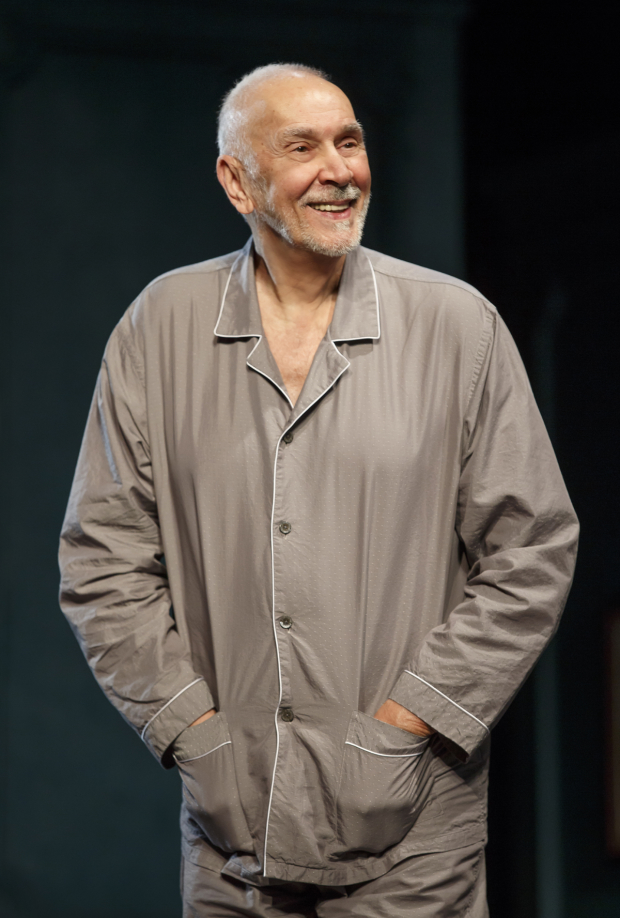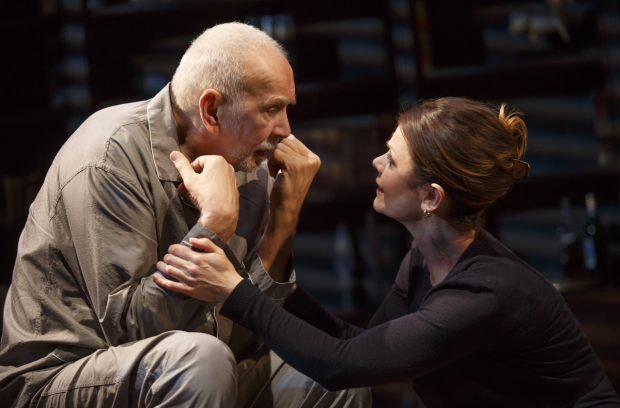The Father

(© Joan Marcus)
Wasn’t there a credenza on that wall? And this bookcase — weren't there books on the shelves at one point? What we see and what we don't plays a dangerous game with us during Manhattan Theatre Club's American premiere of Florian Zeller's West End smash The Father at the Samuel J. Friedman Theatre. Through several ingenious flourishes of playwriting and stagecraft, we're placed directly in the brain of André (Frank Langella), an 80-year-old Frenchman who is powerless to stop his life from unraveling around him.
We first meet André in the midst of an argument with his daughter, Anne (Kathryn Erbe). André has chased out yet another helper, this time threatening her with a curtain rod and accusing her of stealing his prized watch. André, we learn, is no longer in a place where he can live alone, and Anne is about to move to London to be with her companion, Pierre. Shortly thereafter, a man claiming to be Pierre appears in the living room, but André doesn't recognize him. And when Anne arrives home from the market, André is further thrown for a loop when she seems to be a stranger to him as well.
To give more away would destroy the Twilight Zone-like nature of this Rubik's Cube of a drama. It's a smart, tricky, and ultimately heartbreaking look at the bewildering disorientation caused by aging, memory, and identity loss, and the grief it causes when families rapidly start to lose their patience.
André is a five-course-meal of a role for an actor of Langella's stature, a Lear-like man whose disintegration from authority figure to whimpering child calls on a performer's entire arsenal of emotion. While he has a tendency to veer into Master Thespian territory, complete with flailing arms and affected speech pattern, Langella is quite extraordinary when he drops these histrionics to burrow into Andre's fragmented world. These poignant instances are devastating, and one in particular is so overwhelmingly difficult to watch that it provoked three rounds of collective gasps from the audience. The painful honesty Langella brings to these moments forever sear them into our memory.
It's difficult to stand up against a performance as beautifully small and distractingly large as Langella's, and the rest of the cast is only adequate, without going above and beyond. As Anne, Erbe is strangely apathetic, wearing only an air of exasperation along with a handsome business suit (Catherine Zuber provides the upper-crust costumes). Kathleen McNenny and Hannah Cabell radiate various degrees of warmth as the other women who come in and out of André's life. Charles Borland is surprisingly vicious as an uninvited guest, while Brian Avers, hair shiny and slicked back, is appropriately smarmy as Anne’s companion.
Director Doug Hughes should shoulder most of the blame for the deficiencies in the performances, but they are also partly caused by the script. Christopher Hampton's translation from Zeller's original French retains the Parisian setting, though the dialogue is distinctly English in tone. For their part, the actors speak with American accents (except Langella, whose dialect can only be described as "theatrical"), and one wonders why Hughes and the British-born Hampton didn't just switch words like "flat" to "apartment." Not that the geographical location is a crucial element to the work itself, but changing the setting to the United States could have allowed these elements to be less distracting.
Scott Pask's stately set is a seventh character, with antique pieces of furniture intriguingly serving to distort our beliefs as much as André's. Donald Holder's harsh zaps of strobe lighting further add to this enigmatic quality, with illusion consultant Jim Steinmeyer providing assistance to make transitions look like magic.
Ultimately, The Father will strike a chord with anyone who has lived (or is currently living) through a family member's battle with memory loss. It also teaches us an important lesson: After spending 90 minutes walking around in their baffled shoes, we'll think twice the next time we let frustration get the better of us.

(© Joan Marcus)










